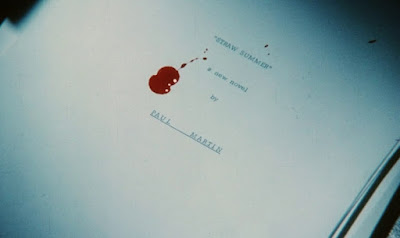The always odd Udo Keir plays Paul Martin, a successful
author who rents a remote cottage in Essex in order to work on his second book.
He has an on-off relationship with porn
star Fiona Richmond, i.e. he gets on, then off, then sends her packing. Their ‘love’
scenes have a rough and ready quality that makes them seem more explicit than
they really are, but then some of that might be due to him putting on latex
gloves every time they get it on.
Paul hires a secretary over the phone to help type up his
masterpiece and is delighted when she turns out to be Linda Hayden, who brings
her usual blend of jailbait precocity to the role, and forgets to bring a bra.
Linda is a compulsive masturbator and, when she is caught fiddling with herself
in a field by a couple of bicycle riding 'youths' (including an already balding Karl ‘Brush Strokes’ Howman), an unpleasant
rape scene (is there any other type?) ensues. This young woman is not quite the pushover she
seems, however, as the yokels who assault her find out to their cost.
The last half hour explodes in a frenzy of rough sex and
sharp knives and a soap opera plot twist which makes enough sense to validate
all the huffing, puffing and intimate touching that has gone before. Unlike the BBFC, I
wouldn’t describe the film as nasty, rather as an adult psychodrama that
occasionally gets a little too adult for comfort: if Ingmar Bergman had made it,
it would have been hailed as a masterpiece (it’s worth remembering that Bergman’s
film ‘The Virgin Spring’ was the inspiration for ‘Last House on The Left’). Probably.
I enjoyed the rural setting (it was filmed near Chelmsford, the furthest extent of 'my' Essex), and the scene where Keir
drives a brakeless Morris Minor into a pond. I liked Linda Hayden, who always does
an excellent sexy psycho, and I was intrigued by Fiona Richmond’s lissom body
and bricklayer’s face. Most of all I enjoyed hearing extracts from the book Paul
is working on, which sounds like it’s going to be truly fucking awful.
Music lovers will be pleased to hear that the film has a rather good soundtrack, but you needn't take my word for it as my friend and colleague Fearlono has made a custom soundtrack for it that you can download at his smashing website Cottage of Electric Hell. One thing: you will need to pretend to be an adult to gain entry, as there are grown up themes and some sexual swear words.
Music lovers will be pleased to hear that the film has a rather good soundtrack, but you needn't take my word for it as my friend and colleague Fearlono has made a custom soundtrack for it that you can download at his smashing website Cottage of Electric Hell. One thing: you will need to pretend to be an adult to gain entry, as there are grown up themes and some sexual swear words.






















































